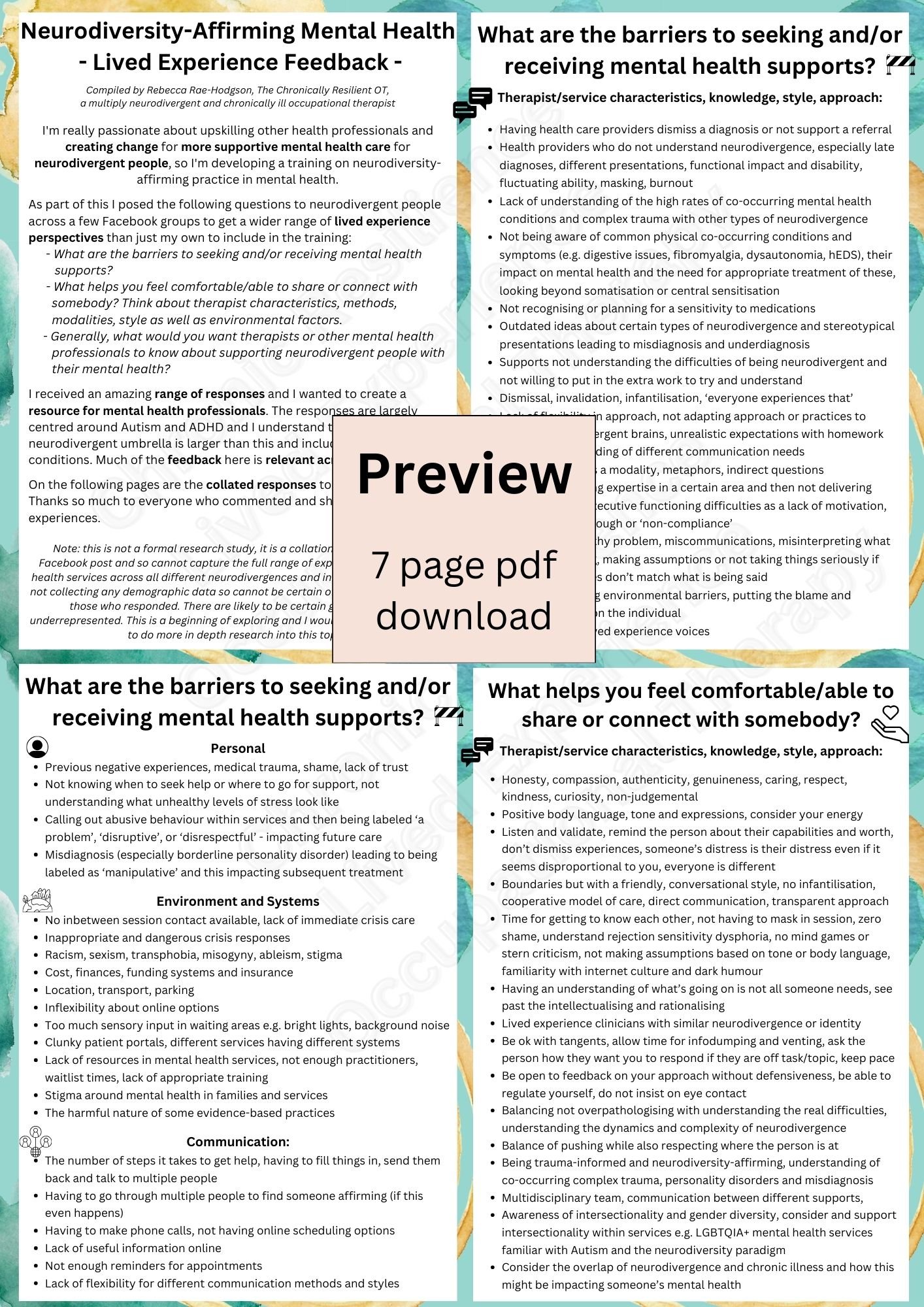 Image 1 of 2
Image 1 of 2

 Image 2 of 2
Image 2 of 2



FREE - Neurodiversity-Affirming Practice in Mental Health, Lived Experience Feedback
I'm really passionate about upskilling other health professionals and creating change for more supportive mental health care for neurodivergent people, so I'm developing a training on neurodiversity-affirming practice in mental health.
As part of this I posed 3 questions to neurodivergent people across a few Facebook groups to get a wider range of lived experience perspectives than just my own to include in the training:
- What are the barriers to seeking and/or receiving mental health supports?
- What helps you feel comfortable/able to share or connect with somebody? Think about therapist characteristics, methods, modalities, style as well as environmental factors.
- Generally, what would you want therapists or other mental health professionals to know about supporting neurodivergent people with their mental health?
I got a range of responses and have compiled the feedback here. Offering for free in respect of the free labour given in the responses.
I hope this is a useful starting point/launchpad/continuation for your own thinking and how you can be more neurodiversity affirming in your practice.
Page 1 - intro
Pages 2-3 - What are the barriers to seeking and/or receiving mental health supports?
Pages 4-5 - What helps you feel comfortable/able to share or connect with somebody?
Page 6 - What I want therapists to know...
Page 7 - A selection of additional resources
Feel free to share in your networks, direct your own therapist to it and spread the word, with credit to me for the time taken to collate, create and put this out. Thank you :)
I'm really passionate about upskilling other health professionals and creating change for more supportive mental health care for neurodivergent people, so I'm developing a training on neurodiversity-affirming practice in mental health.
As part of this I posed 3 questions to neurodivergent people across a few Facebook groups to get a wider range of lived experience perspectives than just my own to include in the training:
- What are the barriers to seeking and/or receiving mental health supports?
- What helps you feel comfortable/able to share or connect with somebody? Think about therapist characteristics, methods, modalities, style as well as environmental factors.
- Generally, what would you want therapists or other mental health professionals to know about supporting neurodivergent people with their mental health?
I got a range of responses and have compiled the feedback here. Offering for free in respect of the free labour given in the responses.
I hope this is a useful starting point/launchpad/continuation for your own thinking and how you can be more neurodiversity affirming in your practice.
Page 1 - intro
Pages 2-3 - What are the barriers to seeking and/or receiving mental health supports?
Pages 4-5 - What helps you feel comfortable/able to share or connect with somebody?
Page 6 - What I want therapists to know...
Page 7 - A selection of additional resources
Feel free to share in your networks, direct your own therapist to it and spread the word, with credit to me for the time taken to collate, create and put this out. Thank you :)
I'm really passionate about upskilling other health professionals and creating change for more supportive mental health care for neurodivergent people, so I'm developing a training on neurodiversity-affirming practice in mental health.
As part of this I posed 3 questions to neurodivergent people across a few Facebook groups to get a wider range of lived experience perspectives than just my own to include in the training:
- What are the barriers to seeking and/or receiving mental health supports?
- What helps you feel comfortable/able to share or connect with somebody? Think about therapist characteristics, methods, modalities, style as well as environmental factors.
- Generally, what would you want therapists or other mental health professionals to know about supporting neurodivergent people with their mental health?
I got a range of responses and have compiled the feedback here. Offering for free in respect of the free labour given in the responses.
I hope this is a useful starting point/launchpad/continuation for your own thinking and how you can be more neurodiversity affirming in your practice.
Page 1 - intro
Pages 2-3 - What are the barriers to seeking and/or receiving mental health supports?
Pages 4-5 - What helps you feel comfortable/able to share or connect with somebody?
Page 6 - What I want therapists to know...
Page 7 - A selection of additional resources
Feel free to share in your networks, direct your own therapist to it and spread the word, with credit to me for the time taken to collate, create and put this out. Thank you :)